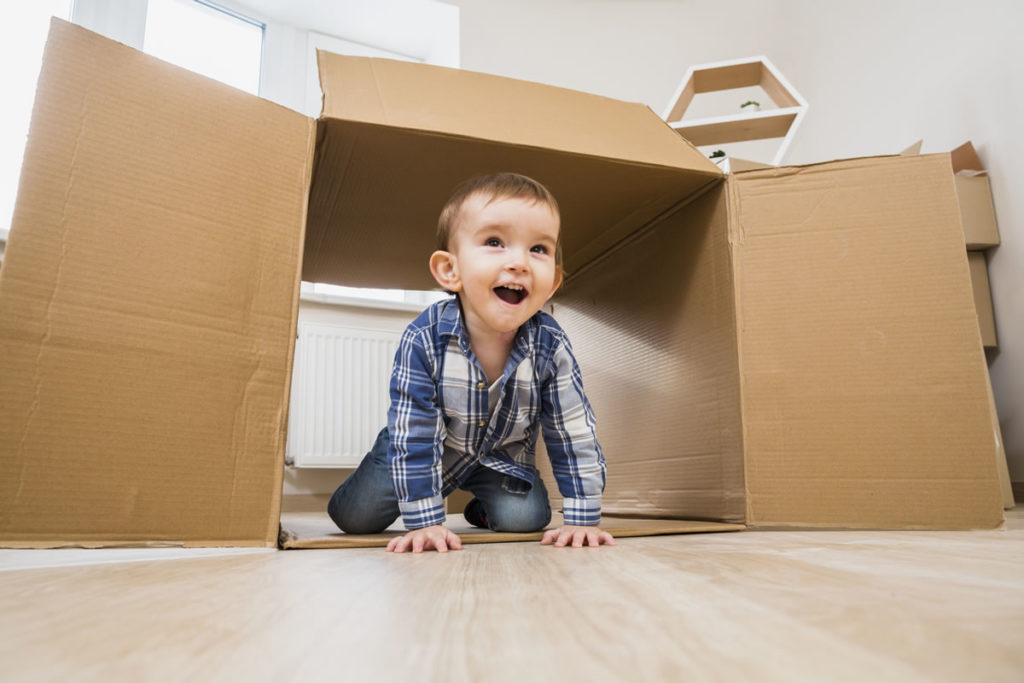Is a new move coming? The beginning of school or kindergarten? Those kinds of big changes are part of life and they shouldn’t mean big dramas for the little ones, however, sometimes they mean a whole world for them. That is why it is very important to remain vigilant and try to keep children happy and safe when these types of changes happen.
Most adults also find big changes disturbing, but for young children any alteration in their routine can go much further, leading to significant levels of stress and worry that they are barely able to combat. And, when it comes to life-changing things, like moving to another house, having a new sibling or separated parents, the impact on young children (especially those of preschool age) can be enormous, and as parents We must not underestimate this. By putting ourselves in their place we can get an idea of how each scene can look from the point of view of the little ones and how we can help them.

Things we can do to teach how to cope with changes
The first step in easing children through change is getting on their level. Children may not understand expressions like “move out” and wonder what it really means. Using toys or drawings, for example, we can give them a point of reference that helps them better understand these types of issues.
With very young children the key is to make the changes seem normal , talk to them as much as possible and focus on all the good things those changes will bring. Change is not something you should protect your children from, because it is inevitable, but the last thing you want to do is make sure your preschooler is afraid of the transitions they will face in life, and that is the way you you face change which will make a difference.
4 common change situations and how to act
- Start of school or kindergarten
If your children are going to face a change like this, you can, for example, organize a party or game day with other children who will be in their class and thus help them prepare to be with many children, which will be even more important if it is brought from only children. If it is about daycare specifically, you can also teach the little ones to go to the bathroom and be a little more independent, or make them understand that you are not going to leave them there, but that you will be every day wanting them to go out to be together again.
You can also go with the children to visit the school before the course starts and normalize it, or go together to get the material they will need in a fun family day. This type of action will make you excited and much less nervous .
- Going on vacation
Not only can permanent changes be stressful, but any alteration in the usual routine, such as going on vacation, can have an adverse effect. If the place you are going to visit is very different from home or it is the first time you are going, show videos or photos so that the children can learn about the characteristics of the place they are going to. Also prepare your children for long trips, and make sure they can be accompanied by a favorite toy or series to better spend the hours. Being accompanied by things that we like makes that on vacation we can feel as comfortable and safe as at home .
- Time to move out
Living in a new home can be very strange and overwhelming. Some children will find this change exciting, but others will feel anxious and angry as they move away from their entire known world.
Try to involve the children in the move from minute one : make them put away their own things, take routes to discover the new neighborhood, create a little collage-book in which a dream house will receive the arrival of “the greatest hero of all times ”… and always explains everything that is happening so that they can understand.

- Separated parents
A family breakdown is very painful for all members of a family, but adults are able to understand why this situation has occurred, which does not happen to children. From the children’s perspective, all they see is that the two people they love most no longer understand each other or want to see each other all of a sudden, which can be a real torment.
Because young children tend to see themselves as the center of everything , they may feel that they made the parent leave or that they were not good and made someone want to leave. If one of the parents leaves, the child should be able to talk and receive explanations, as well as know first-hand the new place where his or her absent parent will live from now on. Having photos also in the room or personal belongings of the father or mother will also make the break somewhat more bearable. That the children always know that they are the most important and loved is the fundamental thing so that little by little they understand that separating is not going to constitute the end of the world.
5 useful tips for dealing with changes
- When you move in, equip the new rooms with a few things that the children themselves choose and make them the center of the new home. For example, a black and white photo of the tree next to the old house, or the photo of the front door with the children when they were babies.
- Keep a simple bedtime routine so that you can reproduce it wherever you go. Even if the other routines can’t be done, sticking to bedtime routines when you’re away from home will go a long way.
- If a new little brother / sister is coming home, don’t forget to remind your first child that he / she is going to be an older brother and that is something super special in life. The day the baby is born, make sure that not all the attention goes to the newborn and have some detail with that special older brother.
- Another of the things that can be done so that children can be done when the arrival of a new baby is to take them to a previous doctor’s appointment, such as the one in which they show us their heartbeat. This way they will be able to better understand the whole process and shorten the wait .
- But whatever the change, the most important thing is that you speak up and be patient. They may not understand everything the first time, and you may have to repeat and insist, but communication and your support will help them calm down and realize that the world is not going to end.











































































































